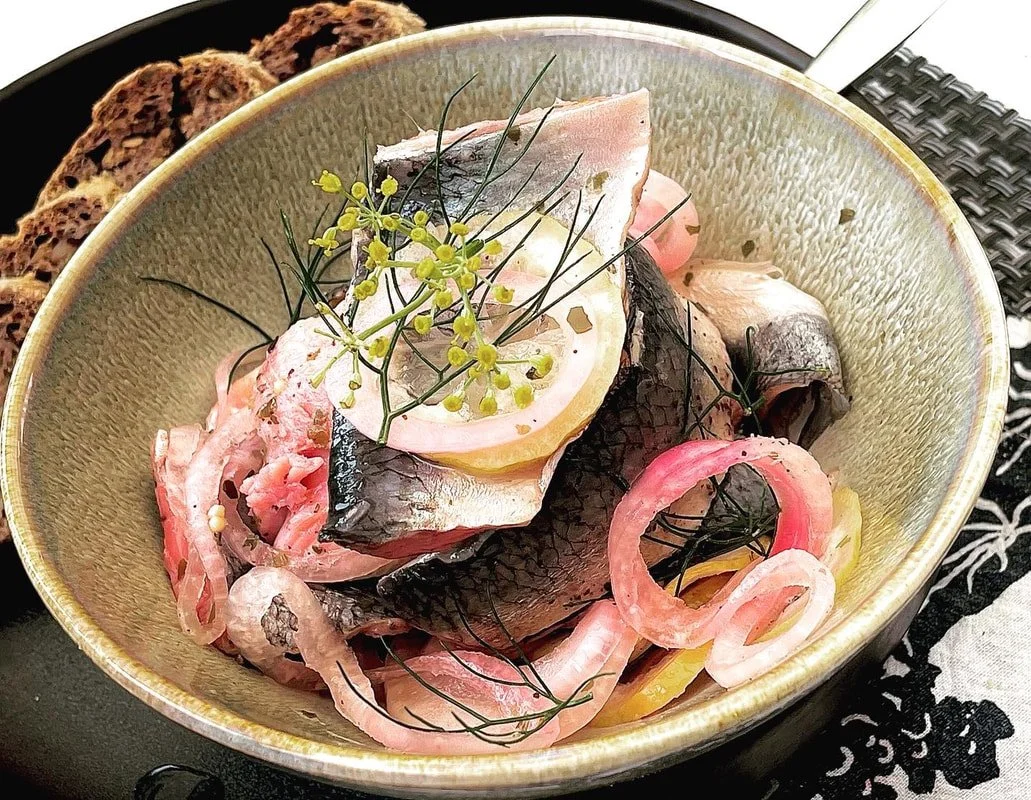Pickled Herrings
If, like me, you align with current nutritional recommendations and aim to increase your intake of omega-3 fatty acids for improved health and mental well-being, you might choose to include more fatty fish in your diet than the average person
Personally, I prefer marinated anchovies, sardines (whether grilled, butterflied, or in tomato sauce), pickled herrings, mackerel, and various preparations of sockeye salmon.
However, I tend to steer clear of certain types of fish, especially farmed varieties like sea bream, sea bass, and salmon, as well as predatory fish known to have higher toxin concentrations, such as tuna, Chilean sea bass, swordfish, and cod (I limit consumption to no more than one portion a month). Studies indicate that these options can be as 'toxic' as conventional meat while providing minimal nutritional value. Additionally, farm-raised fish pose environmental concerns, as they can contaminate wild fish with diseases and pests.
Until recently, I used to purchase pickled herrings in glass jars. However, as stores began hiking up their prices, I decided to explore making them myself. Through various recipe experiments, I discovered that the simplest one was also the best — striking a perfect balance with just the right amount of acidity and sweetness to savour the subtle taste of the sea.
Comparing the price of a kilo of herrings and the price of the jar, I was astonished to discover that they are the same price; however, a jar of pickled herring rarely contain more than 2-3 fillets of small herrings. Therefore, I’ve sworn off buying pickled herrings.
Herring, with its delicate flavours, tends to spoil quickly, making salting, pickling, or smoking common preservation methods.
While I have enjoyed herring in all these forms, there’s something unique to pickled herring.
Imagine tender herring fillets marinated in zesty vinegar and vibrant lemon. It's a tango of flavours, where the tartness of the vinegar and lemon pirouette gracefully with the herrings’ rich omega-3 goodness. But there’s more to this dance — a sprinkle of spices, a dash of sugar, and a chorus of onions and herbs, each contributing its unique charm to this culinary symphony.
An insider tip: Many pickled herring recipes start with pre-salted herring from cans. If you choose these, skip the initial salt brine. Instead, soak them in fresh water overnight; they will retain their sea-salty charm.
Here is the magic trick: A hint of salt is crucial, preventing the herring from turning into mush. Trust me; I have learned the hard way — without salt, it will become a culinary disaster.
The best part?
These pickled herring bites are versatile. Whether enjoyed as a snack, paired with pumpernickel, rye bread, or gluten-free sourdough, alongside potatoes, or on a simple cracker, they shine gloriously.
They make for a delightful pre-dinner treat (tapas) to enjoy with a glass of cooled white wine, and amaze your guests. I have even added them to Niçoise salads with butter beans. The result is absolutely out-of-this-world-delicious.
Uncover the enchantment of pickled herring — a symphony of flavours, a nod to tradition, and a feast for the senses. Immerse yourself in this culinary masterpiece and let your taste buds savour the harmony of the sea. #PickledHerringDelight #CulinaryMagic #TasteOfTheSea
Organic Lemon, Dill and Wild Fennel Marinade
RECIPE
Serves: 4
Prep time: 20 minutes
Equipment: kitchen bowl, glass jar
Recipe:
1 litre water (5 cups), divided
450 g herring fillets (1 pound)
450 ml distilled or white wine vinegar (2 cups)
55 g Celtic or grey sea salt (1/4 cup)
50 g sugar (1/4 cup)
3 bay leaves
3 cloves
2 tsp peppercorns (a mix of black and pink, preferably)
1 tsp mustard seed
1 tsp fenugreek
1 tsp whole allspice
1 lemon (thinly sliced)
1 medium red onion (thinly sliced)
Method
Heat 750 millilitres of water to dissolve the salt and then leave to cool at room temperature.
Once cooled, add the herring fillets to the brine and refrigerate overnight for at least 12 hours.
Bring the sugar, vinegar, the remaining water and all the spices to a boil. Simmer for 5 minutes, then turn off the heat. Set aside to infuse until completely cool.
When the herring fillets have brined, layer them in a glass jar with the sliced lemon and red onion. Poor the marinade to cover and add a few more slices of lemon to ensure the herring pieces are completely submerged in the liquid at all times.
Seal the jar and refrigerate for at least 24 hours before eating. Store in the fridge for up to 1 month.
Tip: You may divide the marinade between different containers if you are using more than one. Always make sure that there is enough liquid to cover the herring pieces.
Serving suggestions, tapas-style.


